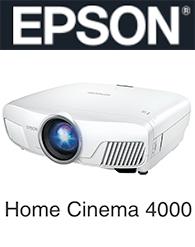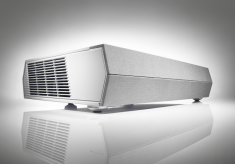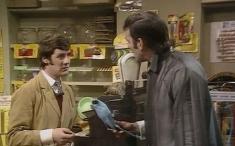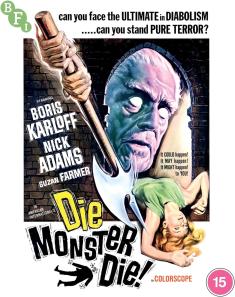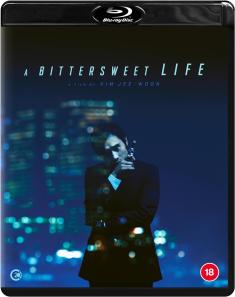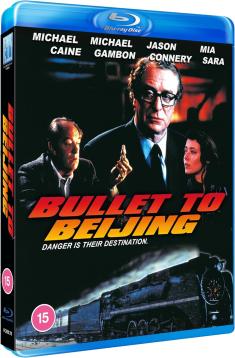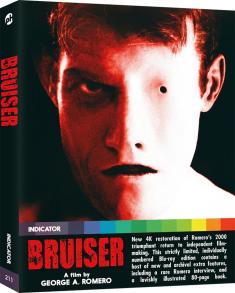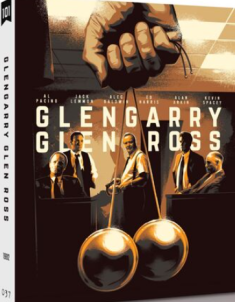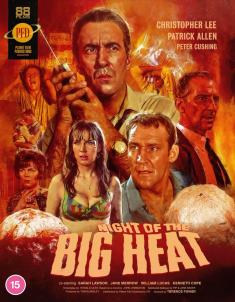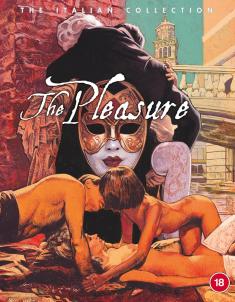Epson Home Cinema 4000 3LCD Projector with 4K Enhancement and HDR
Overview -Overview - The Epson Home Cinema 4000 3LCD projector is, effectively, a Home Cinema 5040UB with less light output and contrast capabilities. Since both feature motorized lenses, 4K Enhancement technology, 3D, HDR10 compatibility, HDCP 2.2 compliance, and 100% DCI P3 wide color gamut reproduction, if you read that earlier review -- HERE -- you'll get a good sense of what it's like to own the Home Cinema 4000, while we'll address picture quality specifics about the HC4000 below.
For the TL;DR crowd, here's the bottom line: if you primarily watch 4K Blu-ray, 3D Blu-ray, or Blu-rays in a media room with a good amount of ambient light (ie, you don't watch movies in the dark), the Home Cinema 4000 is a bargain at under $2,000. That said, if you can afford the extra $300-500, get the Home Cinema 5040UB. It does everything this projector does well, and does it with noticeably better contrast and black levels. However, if your primary source for 4K-HDR content is a streaming box like an Apple TV 4K or Roku Ultra, skip Epson's current generation of 4Ke projectors because you'll be limited to 4K SDR (standard dynamic range) on those devices.
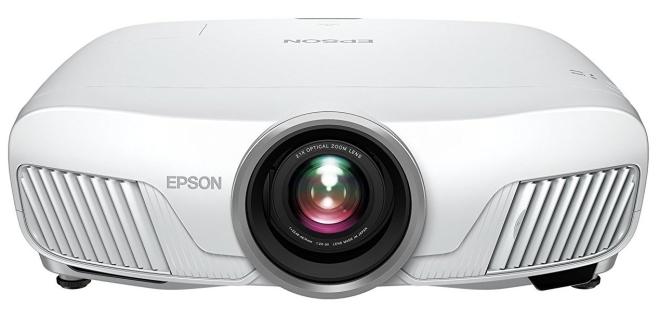
Intro
As we recently covered in our Optoma UHZ65 Laser 4K Ultra HD DLP Projector review (HERE!), not all 4K projectors are actually true 4K with 8-Megapixels on screen. DLP projectors, for example, use shifting mirrors to double a single 4-Megapixels chip to 8.3-million on-screen pixels. Epson and JVC currently offer 4Ke or 4K e-shift technology in some of their projector models. The idea here is to offer 4K/HDR/HDCP2.2 compatibility on a projector with three native HD chips that are shifted diagonally so you end up with approximately 2-Megapixels on screen.
Effectively, these projectors are transitionary home theater products. It's better than HD, taking full advantage of wide color gamut capabilities, and costs about the same as a well-equipped VIZIO or entry-level OLED, but is not true 4K.
The Home Cinema 4000 3LCD Projector with 4K Enhancement and HDR (Model: V11H715120) boasts 2200 lumens of both color and white light output, a 140,000:1 contrast ratios, 100% DCI-P3 color space coverage, HDR10 capability (no Dolby Vision, HDR10+, or HLG), 3D, 4K Enhancement Technology (it plays back native 4K content and upscales HD content), and a 3-axis motorized lens... all in a package that costs less than $2,000 MSRP. It's a deliciously attractive package for anyone who wants to experience the immersion of watching 4K movies on a truly big screen. But is this the right projector for you? Read on.

Key Features
(Courtesy of Epson.com)
Projection System: Epson 3LCD, 3-chip technology
Projection Method: Front / Rear / Ceiling mount
Driving Method: Poly-silicon TFT Active Matrix, 0.74"-wide panel
Native Resolution: 1080p (1920 x 1080) with 4K Enhancement
Pixels: 2,073,600 dots (1920 x 1080) x 3
Color Brightness: 2200 lumens
White Brightness: 2200 lumens
Aspect Ratio: Native 16:9 widescreen (4:3 resize) Compatible with 4:3 with Normal, Full or Zoom Modes
Lamp Type: 250 W UHE
Lamp Life: Up to 5,000 hours (ECO Mode); up to 4,000 hours (Medium Mode); up to 3,500 hours (High Mode)
Throw Ratio Range: 1.35 – 2.84
Size - projected distance: 50" – 300"
Keystone Correction: Vertical: ±30 degrees (Manual)
Contrast Ratio: Up to 140,000:1
Color Processing: Full 10-bit (partial 12-bit)
Color Reproduction: Full-color (up to 1.07 billion colors)
Projected Output: HD, 2D, 3D, 1080p, 4Ke
Color Modes: 2D: Dynamic, Bright Cinema, Natural, Cinema, Digital Cinema, Black & White Cinema
3D: Dynamic, Cinema
Input Signal: Composite: 480i , 576i, 480p, 576p, 720p, 1080i, 1080p, 4K x 2K, 4K/60 Hz/4:2:0
Terminal Inputs: HDMI® x 1 (HDCP 2.2), HDMI x 1 (HDCP 1.4), USB Type A x 2 (1 x for optical HDMI cable 300 mA power supply only), Mini USB x 1 (service only), LAN x 1 (RJ-45), Computer/D-sub 15 pin x 1, RS-232c x 1
Fan Noise: 20 dB – 31 dB
Weight: 24.3 lb
Dimensions: 20.5" x 17.7" x 6.7" (W x D x H)
Power Consumption: 373 W (High Mode), 283 W (ECO Model)
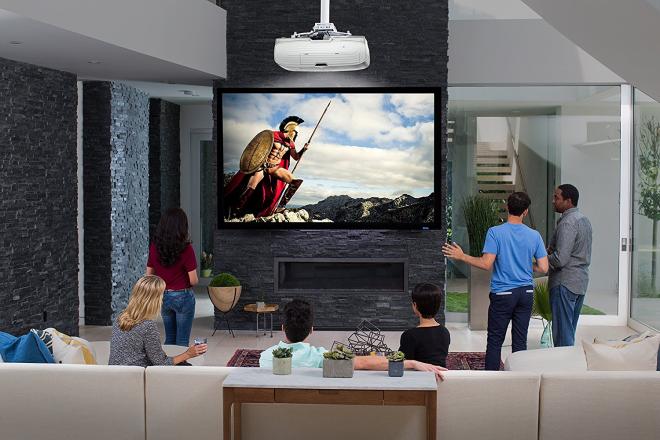
Setup
Setting up an Epson 4Ke projector makes you feel like a pro-installer; it's that easy and also quite flexible in terms of placement. For full coverage of the setup process, do check out our Epson 5040UB / 6040UB REVIEW. The process here is identical, although the firmware has been updated for all Epson 4Ke models since that review was written.
Effectively, you pick a location for your projector, be it in front of a screen or behind, right side up or upside down, turn it on, and use the projector's motorized adjustments to fine tune zoom and focus. Unlike the Optoma projectors we've tested of late, Epson 4Ke projectors are very flexible in terms of placement, and they're much easier to dial in because you can put your eyes right up to your screen.
For my review setup, I paired the HC4000 with a 100" Silver Ticket Products High Contrast Grey screen (reviewed HERE) along with a Samsung 4K Ultra HD Blu-ray Player, Roku ULTRA, Apple TV 4K, and a Celerity Technologies fiber optic HDMI cable routed through a Denon AVR-X6200W. Epson also included a pair of 3D Glasses (RF) ELPGS03, which cost $99 each if you buy them from Epson or HERE is a 4-pack from Amazon for just under $130.
Epson includes six color modes from which to choose, each one offering different balances of color output, contrast, and overall brightness:
Dynamic. Best for projecting in a bright room
Natural. Best for projecting in a dark room
Bright Cinema. Best for projecting in a room with closed curtains
Cinema. Best for projecting color movies in a dark room
B&W Cinema. Best for projecting black and white movies in a dark room
Digital Cinema. Projects using the same color spectrum as digital movie theaters (note: this is the only mode where you get 100% P3 color space coverage)
For SDR content, I mainly used Bright Cinema at night and Dynamic for daytime news & sports. For HDR content, here's what Epson recommends (also covered HERE in more depth):
High Quality in Dark Viewing Environments. Digital Cinema Color Mode with HDR Auto Mode.
Optimal Quality and Brightness Blend. Bright Cinema Color Mode with HDR Auto Mode.
Optimal Quality and Brightness in High Ambient Light. Bright Cinema Color Mode with HDR Auto (Bright) Mode.
For my 4K/HDR purposes, I typically stuck with Digital Cinema + HDR Auto or HDR Auto (Bright).

What We Loved
Much like the Home Cinema 5040UB and Pro Cinema 6040UB, the Home Cinema 4000 has a lot going for it. The setup is easy, thanks to its motorized controls, a truly high-end feature in this budget projector. More importantly, the optics are so good, you'd be hard-pressed to tell this isn't a native 4K device. It's also quite bright, despite being down 300 lumens compared to the 5040UB and down 700 compared to the Optoma UHZ65. But, to be honest, this projector seemed to over-perform its specs and was bright enough to watch movies and TV shows with all the curtains open as well as with the lights off and the curtains closed.
Then there are the colors. Dear lord, it's my favorite capability on these Epson projectors. With the ability to reproduce 100% of the DCI P3 color space, your HDR10 encoded movies ooze vivid, rich, sumptuous color. Blade Runner 2049 and Pacific Room look INSANE, and you can even kick into wide color on SDR material, which is fun when you're watching a classic Technicolor movie like Vertigo. Basically, the colors are so good on the Epson HC4000, it makes the Optoma UHZ65, which costs $2,500 more as I write this, look dull and bland. The reason for this is color volume. The Epson puts out a full 2200 lumens for each of the three color channels so, unlike DLP projectors, 3LCD projectors don't blow out white levels while chasing brighter colors.
Speaking of which, this projector isn't as refined as LCD, OLED, or QLED panels when it comes to dynamic range and properly executing HDR10, but in places where DLP projectors fail visibly, the Epson tone-maps its highlights quite well. You'll enjoy a nice sense of highlight details around bright objects in HDR-graded movies like Guardians of the Galaxy Vol. 2.

Jumping down to 1080p material, the Home Cinema 4000 did a great job while watching sports during the day, and you haven't really watched your favorite TV series until you've experienced it on a cinematic 100" screen. Shows like The Americans or Billions or Fargo become even more captivating than normal. Blu-rays look terrific too; in some ways, although they don't have the wide color of their 4K counterparts.
My second favorite feature, after the colors, is this projector's 3D capabilities. We'll talk about contrast in the next section, but the HC4000 doesn't do a great job with it, to be honest. However, when you add active 3D glasses to the mix, the image darkens and percieved-contrast improves noticeably. Couple that with the incredible imersive nature of sitting close to a 100" screen, and it's like getting sucked into the movies. Mad Max: Fury Road, The Wizard of Oz, Gravity... find your favorite 3D movie and experience it like this. It's INCREDIBLE (assuming you like 3D and don't get headaches). It's like having your own 3D IMAX and also like you don't have a screen at all. What a shame that more 4K devices don't offer 3D playback.
To sum up what we liked, the Home Cinema 4000 is very impressive for its price. With a motorized lens, excellent optics, jaw-dropping 3D, and sumptuous color rendering, Epson has not only made a fine 4Ke projector, but they've literally ruined current generation 4K DLP projectors for me because they can only reproduce about 80% of the DCI P3 color space.
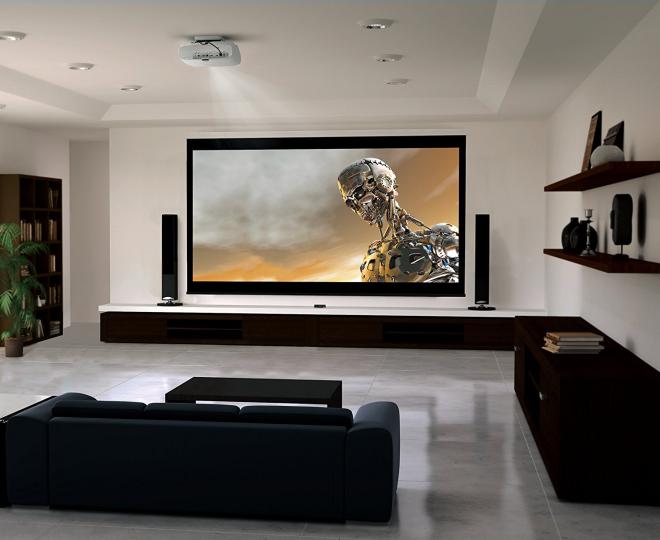
What We'd Change
The Epson Home Cinema 4000 may do a lot of things right, but there are a few minor issues as well as two big issues I personally see as deal-breakers when it comes to buying one.
For the minor stuff, Epson's 4Ke projectors are loud and hot. Since my loaner was a temporary setup on a shelf behind my seating position, this was extra troubling for my review period, but my advice would be to place yours as far away from your ears as possible (in a well-ventilated location). Next, to get the most out of the projector, you want to run it in HIGH mode, but if you do this, you'll be buying expensive replacement lamps every 3,500 hours. Lamp replacement comes with the projector living, of course, but it's something to keep in mind because this $2,000 bargain price might end up costing you more like $3,500 if you keep it for 21,000 hours. I also don't love Epson's menu system.
However, those nitpicks are manageable, survivable compromises. Bigger problems, as I see them, are contrast, black levels, and HDR signal compatibility.
In media rooms or places where you'll be watching with lots of ambient light, the HC4000 will do a fair job. Contrast is decent because it's too bright for you to see what the black levels should look like. However, turn your lights off and you'll see this projector doesn't produce anything close to inky black levels (unless you're watching 3D). Instead, everything is a dark grey, even the letter-boxing on 2.35:1 movies. HDR, SDR, it doesn't really matter, this isn't a projector I can recommend for critical viewing. The Pro Cinema 6040UB wasn't perfect, either, but it and the 5040UB are dramatically more capable (and I've heard great things about JVC).
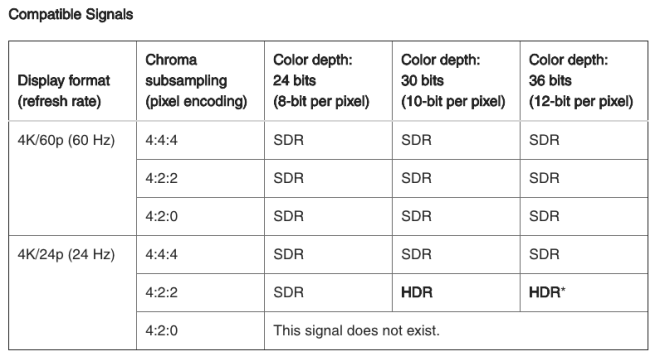
My last main issue is compatibly. Epson's current generation 4Ke projectors accept 4K/24p HDR10 signals via its HDCP 2.2-compliant HDMI input but, per Epson, not 4K/30p and 4K/60p. (I don't think the HDMI input is capable of a full 18Gbps) This means that you're good to go for 4K Ultra HD Blu-ray playback, but you're going to run into trouble with gaming consoles, gaming PCs, and streaming boxes like the Roku Ultra and Apple TV 4K.
For context, 4K HDR streaming devices are typically set to 4K/60 with HDR and, yes, you can adjust output to make it compatible with the HC4000, but when you go to stream actually movies and TV shows in 4K HDR from apps like Netflix, VUDU, and Amazon, you don't get HDR. Instead, you're stuck with 4K SDR, which is kinda-maybe-fine because 4K streams use HEVC and they typically look sharper than HD streams, but you're missing out on the HDR and wider colors. In my experimenting, I was able to get the Epson to accept 4K/30p with HDR from the Roku Ultra and Apple TV 4K, but neither device would playback HDR streams (the Apple TV 4K keeps everything in HDR10, of course, so I specifically mean when you're using Netflix, you'll only see "4K Ultra HD" on shows where you would otherwise see an "HDR" logo. In other words, if you want to stream 4K HDR content, you'll need to skip current generation Epson 4Ke projectors.
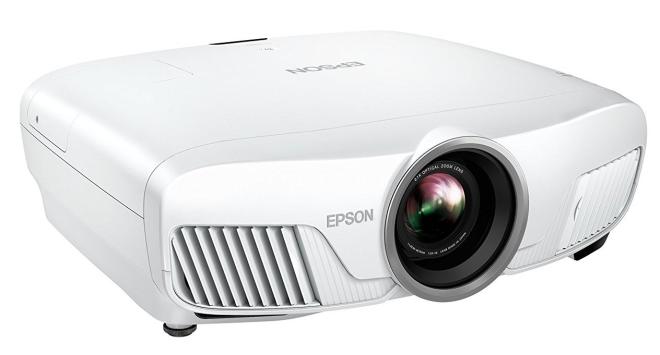
Final Thoughts
Pros
-Bright
-Affordable
-Sumptuous colors
-Immersive film & television viewing
-Excellent 3D performance
Cons
-Not true 4K
-Mediocre contrast & black levels
-No 4K/30 or 4K/60 input capabilities
-Best color modes =/= Brighest HDR Modes
-Lamps are expensive
For less than $2,000, the Epson Home Cinema 4000 3LCD Home Theater Projector is bright and colorful and will make your physical media -- 4K Blu-rays, Blu-rays, and 3D Blu-rays -- shine in the right environment. If this is what Epson can do with pixel-shifted native HD chips, I'm really looking forward to seeing what they can do with a true 4K projector.
However, for critical viewing, contrast and black level capabilities are less than ideal, which is why I'd personally recommend spending the $300-$500 more (sale prices vary) for the Home Cinema 5040UB. It has all the same great features as the HC4000 but boasts a million-to-one contrast ratio.
Also, if you're someone interested in streaming 4K HDR10 content from devices like the Apple TV 4K or Roku Ultra, skip current generation Epson projectors unless you're okay with experiencing all your 4K movies without HDR10 which, in my humble opinion, is the primary reason for a 4K upgrade. (This is literally the only reason I didn't buy an HC5040UB for my living room.)
Bottom Line -- The Epson Home Cinema 4000 is Worth a Look for budget-conscience physical media fans -- it's a fun way to watch 3D and 4K Blu-rays! -- who project movies in rooms with ambient light, but for dark-room viewing and/or HDR streaming, you need to look elsewhere.
